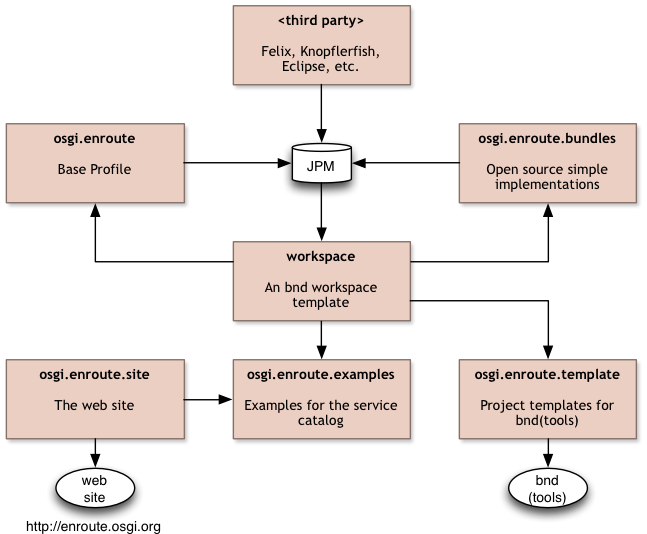
This website and its associated repositories, are deprecated and no longer supported by the OSGi Alliance. Please visit https://enroute.osgi.org for the latest supported version of OSGi enRoute.
This enRoute v2 archive site is kept for those who do not intend to use the latest version of OSGi enRoute. If you are new to OSGi enRoute, then please start with the latest OSGi enRoute.
This page provides you with a map for the components that we use and love to depend on.
We have organized the work around a number of Github repositories. All these repositories are either Apache Software License version 2.0, or EPL 1.0 unless indicated otherwise. To make this all work, there are actually a rather large number of repositories involved, which tends to get confusing. Therefore an illustration how it all hangs together:

osgi.enroute.site – This website! Don’t whine about this website, clone it, change it, and create a pull-request. All contributions welcome.osgi.enroute – The OSGi enRoute Profile and Distro repository. This repository is the source for the OSGi enRoute profiles. You will find the definition here as well as the sources for the service contracts that are not (yet?) part of the OSGi standards.workspace – The OSGi enRoute template for a bnd workspace. This template creates a bnd environment that is all setup to go. It also contains the OSGi enRoute default distro at the latest revision.osgi.enroute.bundles – Some of the services in the OSGi enRoute Base Profile are new and do not have open source implementations (yet!). This repository provides default, and mostly rather simple, implementations for these services. We’re actively pushing these projects into one of the major open source projects.osgi.enroute.template – This repository is an OSGi enRoute workspace for project templates in bndtools. It is a normal workspace but it uses weird names so these names can be replaced when the template is expanded. The template must currently manually be imported in the bndtools build.osgi.enroute.examples – The OSGi enRoute service catalog demonstrates the use of the OSGi API with small examples. These examples can be found in this repository.In sorted order:
Projects providing implementations of OSGi specifications can be found on the following wikipedia page: https://en.wikipedia.org/wiki/OSGi_Specification_Implementations